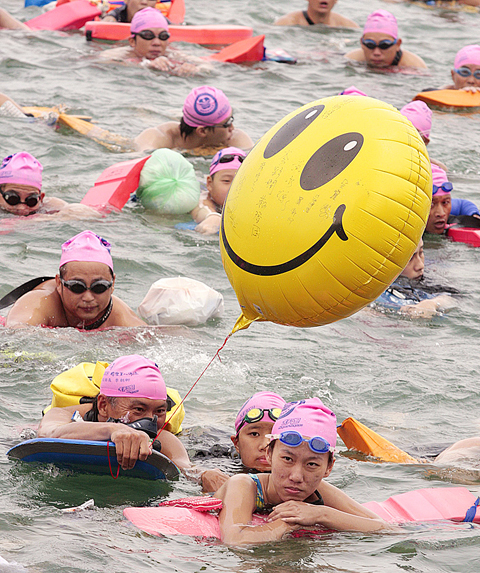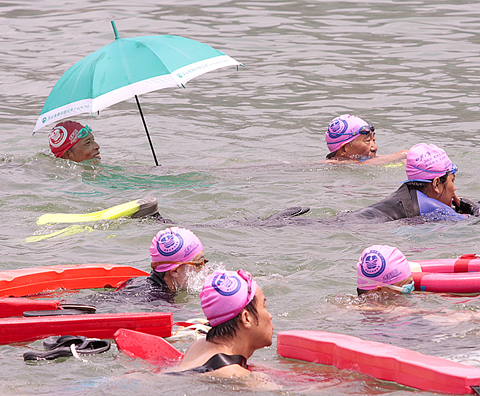Eighteen thousand five hundred swimmers took the plunge yesterday to swim across Nantou County’s Sun Moon Lake during the 26th annual 3.3 km swim.
The swimmers, who included 246 foreign participants from the US, England, Japan, Holland, Australia, China, Hong Kong and Singapore, as well as 297 with physical disabilities, began swimming in groups starting at 7am, with the last swimmer entering the water at about 10:30am, forming a long line across the lake.
The swim, from the Chaowu pier (朝霧) to the Ita Thao Pier (伊達邵), would take a good swimmer between 40 minutes to an hour to complete, the Nantou County Government said, adding that most can reach the other side within two hours.

PHOTO: CHAN CHAO-YANG, TAIPEI TIMES
“The event is a fun gathering for swim clubs from around the country. People display the banners of their swim clubs … it is fun to watch and to be in,” a 52-year-old swimmer surnamed Huang (黃) told the Taipei Times, adding that this was his third year.
In view of the death of two swimmers in last year’s event, the county government this year had taken extra precautions to prevent mishaps, it said, including an underwater GPS system as well as color coding the caps of participants based on fitness levels.
The race was also moved up from September to August so that the water temperature would be more agreeable for swimmers, the county government said.

PHOTO: CHAN CHAO-YANG, TAIPEI TIMES
The GPS system was placed on 20 professional divers who lined up along the first 100m stretch of the swim, since “any unexpected physical problems experienced by swimmers usually occur during the first 100m,” a county government official said.
In addition, participants with physical disabilities, or those over the age of 65, wore pink swimming caps rather than red ones so that lifeguards could keep an eye out for them, he said.
The last swimmer made it onto the shore just before 2pm.
After the race, Nantou County Commissioner Lee Chao-ching (李朝卿) thanked the 36 handicapped swimmers from the Three-legged Cat Swimming Club of the Taichung Welfare Promotion Association for the Disabled (台中市殘障福利協進會) for participating.
Within that group, Huang Chung-hao (黃仲浩), had been the fastest disabled swimmer in the two previous years.
Despite placing second this year, he maintained his time of 40 minutes.
Aside from a woman who hyperventilated and a man who was hurt in the right eye, no major injuries were reported, although five people were sent to hospital after complaining of discomfort, the county government said.

Auckland rang in 2026 with a downtown fireworks display launched from New Zealand’s tallest structure, Sky Tower, making it the first major city to greet the new year at a celebration dampened by rain, while crowds in Taipei braved the elements to watch Taipei 101’s display. South Pacific countries are the first to bid farewell to 2025. Clocks struck midnight in Auckland, with a population of 1.7 million, 18 hours before the famous ball was to drop in New York’s Times Square. The five-minute display involved 3,500 fireworks launched from the 240m Sky Tower. Smaller community events were canceled across New Zealand’s

The Ministry of Foreign Affairs (MOFA) yesterday said it is closely monitoring developments in Venezuela, and would continue to cooperate with democratic allies and work together for regional and global security, stability, and prosperity. The remarks came after the US on Saturday launched a series of airstrikes in Venezuela and kidnapped Venezuelan President Nicolas Maduro, who was later flown to New York along with his wife. The pair face US charges related to drug trafficking and alleged cooperation with gangs designated as terrorist organizations. Maduro has denied the allegations. The ministry said that it is closely monitoring the political and economic situation

‘SLICING METHOD’: In the event of a blockade, the China Coast Guard would intercept Taiwanese ships while its navy would seek to deter foreign intervention China’s military drills around Taiwan this week signaled potential strategies to cut the nation off from energy supplies and foreign military assistance, a US think tank report said. The Chinese People’s Liberation Army (PLA) conducted what it called “Justice Mission 2025” exercises from Monday to Tuesday in five maritime zones and airspace around Taiwan, calling them a warning to “Taiwanese independence” forces. In a report released on Wednesday, the Institute for the Study of War said the exercises effectively simulated blocking shipping routes to major port cities, including Kaohsiung, Keelung and Hualien. Taiwan would be highly vulnerable under such a blockade, because it

UNRELENTING: China attempted cyberattacks on Taiwan’s critical infrastructure 2.63 million times per day last year, up from 1.23 million in 2023, the NSB said China’s cyberarmy has long engaged in cyberattacks against Taiwan’s critical infrastructure, employing diverse and evolving tactics, the National Security Bureau (NSB) said yesterday, adding that cyberattacks on critical energy infrastructure last year increased 10-fold compared with the previous year. The NSB yesterday released a report titled Analysis on China’s Cyber Threats to Taiwan’s Critical Infrastructure in 2025, outlining the number of cyberattacks, major tactics and hacker groups. Taiwan’s national intelligence community identified a large number of cybersecurity incidents last year, the bureau said in a statement. China’s cyberarmy last year launched an average of 2.63 million intrusion attempts per day targeting Taiwan’s critical